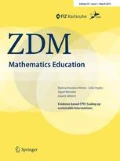Abstract
In this paper, we first discuss the teaching of values by focusing on the kinds of values that have been discussed and studied in the other papers in this special journal issue and elsewhere. Then we raise a number of issues about the product-based values in mathematics education, which we identify as teaching values and which can be realized through classroom instruction. In the second section, we discuss the process-based valued teaching methods used to maximize the realization of the teaching values in the classroom. As valued teaching may be perceived differently by different people, in the discussion we analyze how it is seen from both students’ and teachers’ perspectives. We end this paper by discussing a number of methodological issues in studying teaching values and valued teaching as well as offering suggestions for future research.
Similar content being viewed by others
References
Baba, T., Iwasaki, H., Ueda, A., & Date, F. (2012, this issue). Values in Japanese mathematics education: A historical development. ZDM—The International Journal on Mathematics Education.
Bishop, A. J. (1999). Mathematics teaching and values education: An intersection in need of research. ZDM—The International Journal on Mathematics Education, 31(1), 1–4.
Bishop, A. J. (2012). From culture to well-being—a partial story of values in mathematics education. ZDM—The International Journal on Mathematics Education (this issue).
Bishop, A. J., FitzSimons, G. E., Seah, W. T., & Clarkson, P. C. (2001). Do teachers implement their intended values in mathematics classrooms? In M. V. D. Heuvel-Panhuizen (Ed.), Proceedings of the 25th Conference of the International Group for the Psychology of Mathematics Education (Vol. 2, pp. 169–176). Utrecht, The Netherlands: Freudenthal Institute.
Bransford, J. D., Brown, A. L., & Cocking, R. R. (2000). How people learn: Brain, mind, experience, and school (Expanded ed.). Washington, DC: National Research Council.
Cai, J., & Cifarelli, V. (2004). Thinking mathematically by Chinese learners: An international comparative perspective. In L. Fan, N-Y Wong, J. Cai, & S. Li (Eds.), How Chinese learn mathematics: Perspectives from insiders (pp. 71–106). Singapore: World Scientific Publishers.
Cai, J., Kaiser, G., Perry, R., & Wong, N.-Y. (Eds.). (2009a). Effective mathematics teaching from teachers’ perspectives: National and international studies. Rotterdam: Sense Publishers.
Cai, J., & Wang, T. (2010). Conceptions of effective mathematics teaching within a cultural context: Perspectives of teachers from China and the United States. Journal of Mathematics Teacher Education, 13(2), 265–287.
Cai, J., Wang T., Wang N., & Garber, T. (2009b). Studying effective teaching from teachers’ perspectives: A journey has just begun. In J. Cai, G. Kaiser, R. Perry, & N-Y Wong. (Eds.), Effective mathematics teaching from teachers’ perspectives: National and international studies (pp. 305–320). Rotterdam: Sense Publishers.
Goldin, G. A. (2004). Problem solving heuristics, affect, and discrete mathematics. ZDM—The International Journal on Mathematics Education, 36(2), 56–60.
Law, H. Y., Wong, N. Y., & Lee, N. Y. L. (2012). A study of espoused values in Hong Kong’s mathematics classrooms. ZDM—The International Journal on Mathematics Education (this issue).
Lim, C. S., & Kor, L. K. (2012). Excellent primary mathematics teachers’ espoused versus enacted values of effective lessons. ZDM—The International Journal on Mathematics Education (this issue).
National Council of Teachers of Mathematics. (1989). Curriculum and evaluation standards for school mathematics. Reston, VA: National Council of Teachers of Mathematics.
National Research Council, Committee on Highly Successful Schools or Programs in K-12 STEM Education (2011). Successful K-12 STEM education: Identifying effective approaches in science, technology, engineering, and mathematics. Washington, DC: The National Academies Press.
Seah, W. T. & Peng, A. (2012). What students outside Asia value in effective mathematics lessons: A scoping study. ZDM—The International Journal on Mathematics Education (this issue).
Wong, N. Y., Wong, W-Y, & Wong, E. W-Y. (2012). What do Chinese value in (mathematics) education. ZDM—The International Journal on Mathematics Education (this issue).
Acknowledgments
Preparation of this paper was supported by a grant from the Spencer Foundation. Any opinions expressed herein are those of the authors and do not necessarily represent the views of Spencer Foundation.
Author information
Authors and Affiliations
Corresponding author
Rights and permissions
About this article
Cite this article
Cai, J., Garber, T. Teaching values and valued teaching in the mathematics classroom: toward a research agenda. ZDM Mathematics Education 44, 91–97 (2012). https://doi.org/10.1007/s11858-012-0404-3
Accepted:
Published:
Issue Date:
DOI: https://doi.org/10.1007/s11858-012-0404-3




